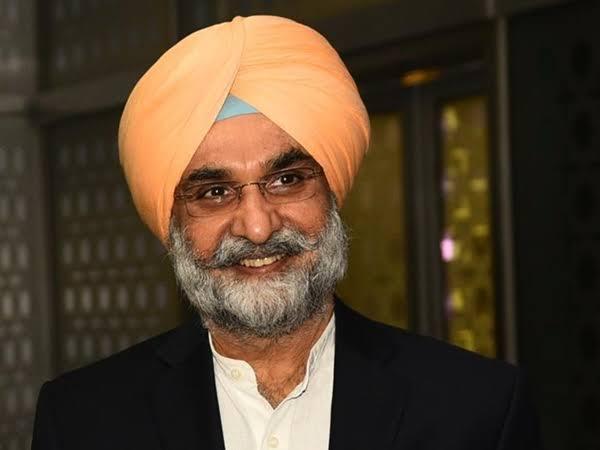Ambassador Taranjit Singh Sandhu visits Atlanta, his multiple engagements cover wide range of bilateral relations
 ]
]
Washington, July 13
India’s Ambassador to the US Taranjit Singh Sandhu travelled to the city of Atlanta this past week during which he had multiple engagements with think tanks, academicians, corporate world, lawmakers and eminent members of the Indian American community to advance bilateral relationship between the two largest democracies of the world.
Sandhu, in his address to the Atlanta Council on International Relations, touched upon key aspects of the India-US bilateral relations, including bipartisan support, increased trust, people as the focus, role of industry, civil society and strategic community.
In his remarks, the top Indian diplomat also outlined the immediate priority areas – strategic and defense, healthcare, digital, clean energy and climate change, and education and knowledge partnership.
Sandhu’s trip to Atlanta is part of his continued outreach focusing on key priorities, including healthcare, education and knowledge partnership.
With Atlanta being the home of top two universities – Emory University and Georgia Tech – the Indian envoy had an interactive session with academicians and students at both the educational institutions.
Emory University is the second oldest institution of higher education in Georgia. It has over 8,000 students enrolled in 150 programmes. There are about 300 Indian students and over 500 Indian-origin students who are enrolled in various programmes.
Sandhu visited Woodruff Health Sciences Center. The Emory University has developed molnupiravir, a drug used to treat COVID-19 which was licensed by Merck to manufacture in India, as well as involved in clinical trials of Moderna vaccine for COVID-19 variants. During his visit, the Emory’s team briefed the ambassador about their strong partnerships with institutes in India.
Emory Vaccine Center and the International Center for Genetic Engineering and Biotechnology established a Vaccine Center in New Delhi. Center for the Control of Chronic Conditions (CCCC) at Emory researches and treats chronic health issues in India. The Center is an international partnership between Emory, the All India Institute of Medical Sciences, the London School of Hygiene and Tropical Medicine, and the Public Health Foundation of India.
Emory’s health department is also working on developing joint center of excellence. Under the proposed MoU, CSIR-IGIB and Emory University will enter into research collaboration that will allow them to explore areas of mutual interests, in which CSIR-IGIB will provide collaborative expertise and research skills in the field of immunology, computational and systems biology, cell and molecular biology, genetics, epidemiology, clinical sciences, molecular and precision medicine and other allied scientific areas.
At the prestigious Georgia Tech, the ambassador interacted with its leadership, faculty and students and discussed strengthening partnership in STEM areas. He also visited the Kendeda Building at Georgia Tech, which is one of the 28 “living buildings” in the world and one of the world’s most ambitious and holistic green building achievement.
Georgia Tech is among America’s most research-intensive universities. It has tie-ups with Indian educational institutes, including Indian Institute of Science, Bengaluru. Georgia Tech’s students represent 50 states and 149 countries. Out of total 40,000+ students, Georgia Tech has over 5,000 Indian or Indian-origin students.
During his trip to the city, the ambassador also met Senator Jon Ossoff, senior Congressman Sanford Bishop and Congresswomen Lucy McBath and Nikema Williams. In addition, the ambassador also interacted with a bipartisan group of legislators from Georgia Senate and House, during which healthcare as well as enhancing infrastructural, educational and trade connect between the State and India was discussed.
Sandhu paid respects at the King Center for MLK and paid tribute to Gandhiji. Family members of Martin Luther King and local prominent leaders from Indian-American and African-American communities participated at the function.
The Indian ambassador met prominent members of the Indian community in Atlanta belonging to diverse fields, including business, trade, research, education, IT and science. Separately he held an interaction with young professionals in the area, many of who are entrepreneurs/CEOs of firms based in the region. PTI
Indo-Pacific area is broad space where we can cooperate, says Mexican Ambassador to Indi- The New Indian Express
 ]
]
Pushkar Banakar By
Express News Service
NEW DELHI: The Mexican Ambassador to India Federico Salas talks on how the pandemic has changed India-Mexico ties, the Indo-US trade deal and on how the two countries can cooperate in different areas.
How has the pandemic affected India-Mexico ties? What were the challenges that you faced during the pandemic and how do you see India-Mexico relations evolve in the post-pandemic era.
It has changed relations in a positive way. We (India and Mexico) are some of the hardest hit countries in the world. It made us realise that we need to deal with health issues worldwide from a multilateral perspective, not only for the coronavirus pandemic but also for the future. Secondly, it brought us to a
closer dialogue with India in terms of purchase of vaccines. We offered our support and aid during the second wave here. Mexico and India are non-permanent members of the UNSC and this issue has been raised to ensure work is done globally.
The pandemic has brought us closer as we have a common challenge to face and we are trying to overcome it. Mexico has been looking with different eyes at the pharmaceutical sector of India and the potential it has not only with respect to Covid but other issues. We are working to acquire medicines from different labs in India for the Mexican health sector. There is a future there as well.
You had recently said that you could share your good and bad experiences with India on the trade deal with the US. Have you officially shared your experiences? What, in your opinion, is delaying the deal?
Mexico has negotiated a major trade deal with USA and Canada, the NAFTA in 1994 which was updated in June last year. We have had an extensive experience of negotiating with the US one of the most ambitious and state-of-the-art FTAs of the world. It was a complex negotiation. Mexico has always been open to share experiences and good practices in the negotiations.
The agreements are very complex. Even the first NAFTA took at least five years of intense negotiation and requires strong commitments by the negotiating parties. We had a hurdle when the finalisation took place in the final days of the term of George HW Bush. His successor had some issues with the agreement. It almost fell through. We then devised side agreements. We left the FTA intact and negotiated two side agreements on environment and labour. I have no details in this case (India-US trade deal) but these things take time and I am not surprised. Many sectors in different countries are protective and defensive of what might happen while negotiating with an economic super power like the US. However, that is not necessarily the case as Mexico has proved it.
Are there any plans of Mexico joining the Quad or any bloc with regard to the Indo-Pacific as you have stated that both India and Mexico believe in a rules-based international order?
No formal discussions on Quad have taken place but there have been discussions of academic nature and also on the concept of the Indo-Pacific. The concept is fluid and is still in the making. As we understand it, the Indo-Pacific extends from east coast of Africa to west coast of America. It is a
broad space where we can cooperate and it will happen in the future in a more complete fashion. We discuss issues like trade facilitation and investments. Our security interests in the South China Sea are limited but we certainly support the principle of free navigation and peaceful spaces as even though we do not have a physical presence, we have a commercial presence. Hence, we feel these spaces should be kept open and free.
Recently, environmentalist Jaydev Payeng signed an agreement with a Mexican NGO where the two parties agreed to take up plantation drives in 8 lakh hectares of land in Mexico. How do you see this collaboration given that climate change is a serious issue? Also, how are India and Mexico planning to cooperate on the issue of climate change?
Payeng went to Mexico last year to participate in an event where a foundation in Mexico decided to start working with him for plantation drive because of his experience. This is a private thing but we are very happy that this cooperation is taking place. We are working with India at the multilateral level. We have a mechanism in place through which we have been working with India and Germany to deal with pollution issues. The same measures used to reduce pollution in Mexico City may be effective in cities like Delhi and other cities. This is bilateral cooperation on this issue.
Any update on the dispute between the Khadi Village and Industries Commission and a Mexican firm on the registration of the Khadi brand and logo?
I do not have details of the particular case you mentioned but I can say that one of the good things that has happened in the relationship between Mexico and India is that the relationship has become more intense. There are some frictions and some disputes may arise. Fortunately, we have mechanisms to deal with this. We are negotiating with India, an agreement with regard to the protection of promotion of investments. It should be finalised by the end of this year.
With India assuming the presidency of the UNSC and Mexico also being a non-permanent member of the council, what sort of cooperation can we expect?
We are committed to India’s priorities and we will come up with our priorities for our presidency in November. We are supportive of India’s priorities like maritime security and fighting terror. We are working together at the council on many issues.
Breaking news: Schools in Delhi to reopen partially from August 9, announces DDMA
 ]
]
Welcome to hindustantimes.com live updates platform where you can find breaking news from India and across the world. Find fast updates about the latest news as it breaks. Missed an important news update? Worried about what is happening in the world of finance and how it will impact you? Want to know about the latest update on Covid-19? Don’t worry, we have you covered.
Get latest news, breaking news, latest updates, live news, top headlines, breaking business news and top news of the hour.